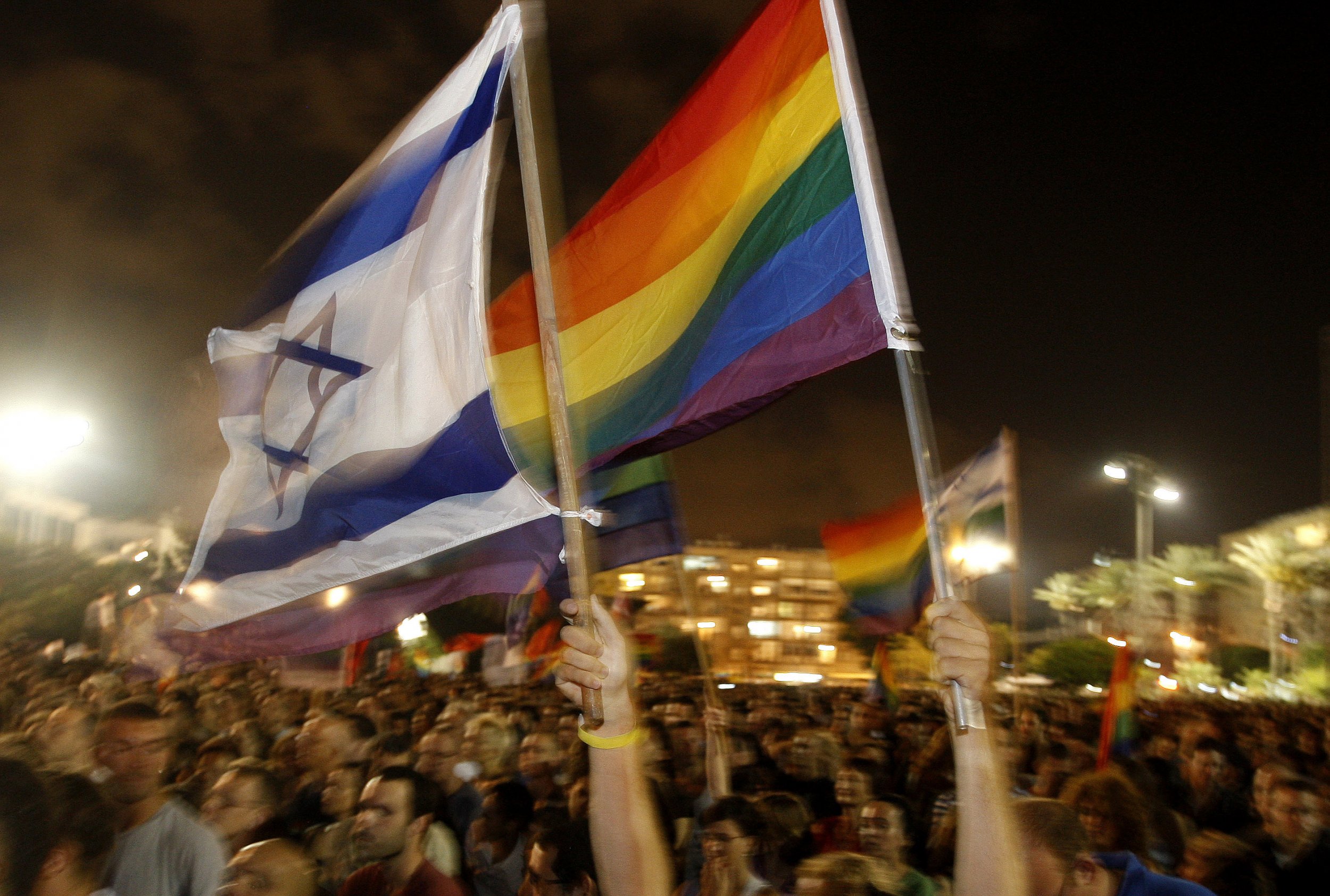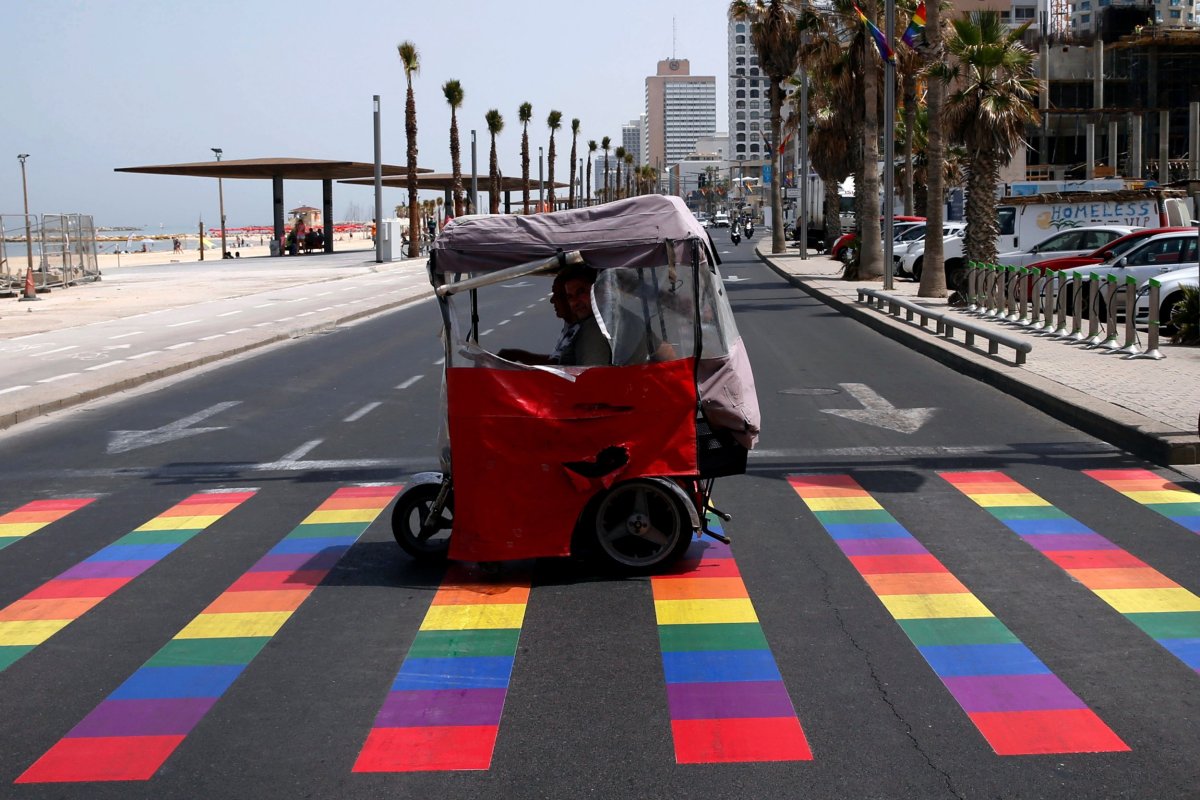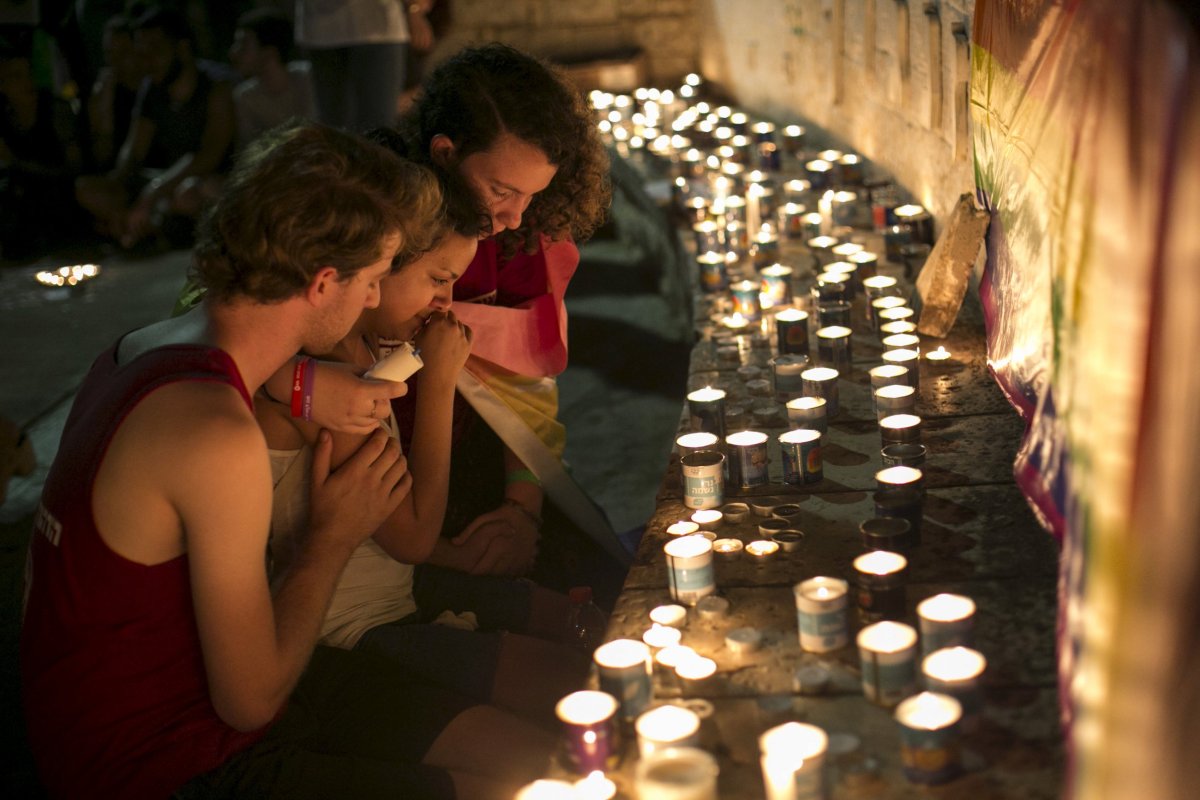
Being in Israel is like being in a small room full of astronomically famous celebrities you've never considered having corporal beings. The names on the little paper map our tour guide handed out on the first day were shocking simply for existing: The Sea of Galilee, Nazareth, the Jordan River. These places figured more into my imagination as legends than as actual locations that one could drive to in a tour bus, but here I was last year, on LGBT Birthright, with 40 other American and Canadian LGBT 20-somethings, all very jet lagged and a little gobsmacked.
A moment before, as a rocket warning siren wailed ("Just a test," an Israeli soldier said, smiling calmly), the group of us sat in a circle on the floor of Ben Gurion International Airport in Tel Aviv, scoping each other out. It was electric to be with a group of all LGBT people, even ones I didn't know—it provided that sense of tacit belonging typically only found in gay bars or on the occasional gay beach. Everyone but our tour guide, bus driver and armed guard—a hulking young man with a pistol on his waist—was queer, including the two American counselors and the five Israelis assigned to our group: three baby-faced Israeli Defense Force soldiers temporarily relieved from duty and a lesbian couple from Jerusalem, Chen (the "ch" is pronounced like "Chanukah") and Rotem, who'd already served and were now university students.
Awe quickly turned to vertigo as we fell from anticipation into reality. On our way from the airport in Tel Aviv to the north of Israel, I looked out the bus windows at a hulking gray concrete wall. The seams where the slabs were joined zipped by and a lifetime of news stories cascaded in my mind. Our tour guide, a jovial Israeli woman, unhooked the bus microphone and started talking. "This went up after the Second Intifada, and I can tell you what it was to live in Israel those two years," she said, referring to the time of the second Palestinian uprising against Israeli occupation, and Israeli retaliation. It was an intense period of violence beginning in 2000 that left 3,000 Palestinians and 1,000 Israelis dead by 2005. Two years in, then–Prime Minister Ariel Sharon started building the wall, cutting off the West Bank. "When you heard more than one siren, you knew something had happened. You'd call relatives—then call the hospital if they didn't pick up," the tour guide said. "I hate that the wall was built. On the one hand, I know that the terrorist attacks went from 100 to nearly zero. On the other, I know that it ruined these people's lives."
On the second day, we piled out of the bus atop an overlook in the occupied Golan Heights, a region formerly part of Syria that was annexed by Israel in a move that has never been internationally recognized. "That's where ISIS is," Chen said, pointing to the mountains of Lebanon in the distant north, and, just to the right, eastward "that's where the Syrian war is happening."
Chen and Rotem considered themselves on the "left wing": They hate Benjamin Netanyahu, the hawkish prime minister, and told me what it was like to be Bibi dissenters during the last election. When the results were announced, right-wing Israelis took to the streets, shouting racists and homophobic epithets, so they didn't leave their apartments. "It was scary for us as Israeli citizens," said Chen, "They said shitty things about gays, and shitty things about Arabs."
But the rest of the Israelis on our trip stayed mostly quiet about politics, and a few times I saw them shake their heads as Chen and Rotem spoke. Most of the Americans and Canadians, meanwhile, seemed to have not given much thought to the Israeli-Palestinian conflict. Even the a lesbian college student who wore black denim cutoffs and crop top muscle tees and routinely pressed the Israelis we met with thoughtful questions asked me if I thought it was really possible to be anti-Israel without being anti-Semitic. The question was clearly rhetorical.
I did not come on this trip a blank slate. My image of Israel has been shaped by an anti-war upbringing and by learning my trade in newsrooms where stories about the Israeli-Palestinian conflict routinely feature a lot of dead Palestinian kids. I grew up culturally Jewish—a category of human mostly unknown to much of the country but made modestly more famous recently by Broad City's Ilana Glazer and Senator Bernie Sanders. I come from a long line of New York Jewish socialists on one side; the other side survived the Holocaust and then immigrated to the city. Family photos are a mix of Vietnam War protests and shtetl relatives who didn't make it out of old Europe. I was raised by two New Yorkers just outside the city, and though I went to synagogue once or twice as a young child, for the most part being Jewish to me meant bagels and lox at every family gathering and a healthy interest in arguing.
By the time I went on Birthright, I'd had 24 years to cultivate my own particular Jewish identity and I was 100 percent sure it had nothing to do with Israel. And yet I had decided to do possibly the most Zionist thing a young adult can do in 2010s America.
Birthright was conceived in 1998 as a means of "selling of Jewishness to Jews," according to founder Charles R. Bronfman, a billionaire heir to the Seagram's liquor empire. It also happened to start a few years after a report by the American Jewish Committee found that young Jews who have visited Israel are far more likely to marry other Jews. Whether or not that was actually part of the founding intent, the idea of Jewish coupling so pervades the reputation of the program that for years it was rumored that if you married someone you met on your Birthright trip, the program would pay for your honeymoon. (The FAQ page for Birthright addresses this: "If I meet my spouse on a Birthright Israel trip, do we get a free honeymoon? No. Birthright Israel does not give and has not given free honeymoons to couples that meet on our trips.")
The trips, all 10 days long, are entirely free for participants, between 18 and 26 years old. Expenses are covered partly by the Israeli government and partly by wealthy American and Canadian conservatives, like octogenarian casino billionaire and GOP super donor Sheldon Adelson, who has given some $160 million to the program to date. The trips come in a variety of themes, like Israel Outdoors, Spices of Israel, and, as of 2008, a Rainbow trip, designed specifically for LGBT Jews.
I'd heard stories of people who went on Birthright and never came back, because they were so taken with Israel. Other tales told of those who declared upon their return they'd only have children with another Jew; others still actually married someone they met on their trip and, together, moved to Israel to have a family. At the very mildest, people always seemed to come back different, which is to say, "more into Israel."
"Don't get brainwashed," a friend joked with me before I left. I was going on gay birthright, I told him. That stuff doesn't work on the same on gays.

Queerness has historically existed outside of the business of statemaking. From the rise of the nation-state until the very recent present, queer life has been an extralegal life, a personhood not made in the image of the state and certainly no state anywhere made in its image either. Gay, trans and gender-nonconforming people have forged a dazzlingly layered culture outside all that. The term queer itself is a brazen reappropriation of a derogatory slur, self-styled in the past 20 years into a label to identify as outside the spectrum of straight sexuality and gender systems, but also outside of straight political culture, oppressive binaries, racism and sexism. As queer theorist Jose Esteban Muñoz writes, "Queerness is essentially about the rejection of a here and now and an insistence on potentiality for another world."
And then about a decade ago and quite suddenly, a certain set of gay rights that focused on assimilation into mainstream culture—specifically the right to marry, have children, and serve in the military—became a sort of barometer for modernity, a way to separate civilized countries from so-called barbaric ones.
Israel occupies a unique space in this spectrum. It's a new country, relatively speaking, and lacks the sort of national identity forged slowly over centuries of existence. Instead, Israel has actively constructed its identity, picking and choosing indicators of what makes someone Israeli. Jewish religious and racial identity is of course the main piece (Arab-Israeli citizens are treated as second-class citizens). But almost equally important—at least in how the country presents itself to the rest of the world—is Israel's status as the only democracy in the Middle East, a political stance at least partially defined by the country's support for gay rights.
Israel has in fact been ahead of the global curve in improving rights for its LGBT citizens, granting things like the ability to serve openly in the military years before the U.S. did—despite opposition from the many fundamentalist Orthodox Jews that play a major role in Israeli politics. It has also successfully pitched itself as a the only safe place for gays in the Middle East—or, "civilization's front line in the battle against barbarism" of neighboring Muslim-majority countries, as Netanyahu put it in an address to the United Nations last year, speaking broadly about all "values are under savage assault."
(On the other hand, gay marriage is still impossible in Israel, though any couple can obtain most spousal rights through "unregistered cohabitation." A straight Muslim person cannot legally marry a straight Jewish person in the country either.)
It went about its gay branding campaign very deliberately: In 2010, the Tel Aviv tourism board began a campaign to brand the city as "an international gay vacation destination." As theorist Sarah Schulman wrote in an op-ed in The New York Times, the promotion was supported by the country's Tourism Ministry and Israel's overseas consulates, and it included financing pro-Israeli movie screenings at lesbian and gay film festivals in the United States.
This is referred to by critics as "pinkwashing," or the practice of using progressivism on gay rights to justify military interventions or to violate the civil liberties of another group of people—or in Israel's case, to obfuscate its human rights violations in Palestine. While one "other" (LGBT people) is embraced, a second "other" (Palestinians) are obliterated.
Rutgers theorist Jasbir K. Puar takes it one step further, writing that Israel's use of "gay-friendliness" has been weaponized for use as a tool to determine who has the right to national sovereignty—namely, not Palestine. She calls that phenomena "homonationalism," and argues that it's convenient ammunition to have on hand for a state constantly waging a war for its existence. It is also conveniently racist, erasing the reality of Palestinian LGBT people who are Muslim and gay and who do not want to be "saved" by Israel. In the U.S., the reaction to a massacre in an Orlando gay bar was in the same spirit: Islamophobic rhetoric about Muslims hating gays and, therefore, being barbaric, erased the existence of Muslim LGBT people.
As Raillan Brooks put it in a recent Village Voice cover story, "The American LGBTQ community seems not to have figured out that we've been conscripted into the country's Middle Eastern wars, thanks to the liberation narrative that's clotted LGBTQ political narratives in the wake of marriage equality. It did get better—thanks to Uncle Sam—and now, it seems, we owe him. So when he asks for support for drone strikes in Syria, or a blithe military alliance with Israel (one of whose expansion stratagems is to pitch Tel Aviv as a gay mecca reclaimed from the gay-murdering Palestinians), he's also sure to remind us of the "human rights violations" in whatever Muslim state he wants to bomb next."
Pinkwashing, he writes, "gets liberals to consent to intervention after intervention in the names of queer people."
On day three of the Rainbow Birthright trip, our group was ushered into a glossy building in downtown Jerusalem and seated in rows of white plastic chairs facing a screen. Our printed itineraries made no bones about what we were there for: "Stand With Us: Experiencing an Israeli PR workshop emphasizing Israel as a sanctuary to the LGBT community in the Middle East. Picking up facts, tools, and new thoughts about the issues in Israel to take back to your own home."
Once seated, we were handed booklets titled "LGBT Rights in Israel & the Middle East." Inside were full-color, graphic photos of gruesome deaths: Two Iranian men with nooses around their necks; three men lying lifeless in pools of their own blood, captioned, "Gay Iraqi victims of the police and death squads." A quote on the same page read, "Palestinians accuse gay members of their communities of collaborating with Israel." Elsewhere in the booklet was a quote from a gay Palestinian man named Tayseer, saying, "The Palestinian police will kill me… unless my father gets to me first." The other half of the booklet contained a list of pro-LGBT Israeli laws and a list of famous gay Israelis, all in blue and white block letters.
A few of the boys in our group theatrically gasped in delight as a blonde Disney prince walked in. He took his place at the front of the room, flipped on a slideshow, and warned of the U.S. media demonization of Israel and the "dangerous" BDS (boycott, divest, sanctions) movement on college campuses. BDS participants, he said, were really anti-Semites disguising themselves as human rights activists. At this point in the presentation, one girl from our group shouted "Bleeding heart liberals!" Presumably she was referring to the BDS activists, or the American media, or both. The presenter laughed lightly. I took a mental note to stop assuming "gay" necessarily implies "progressive."
Then the scruffy blond offered a tearful retelling of his own coming out story, and the presentation was over. There was no time for the questions I wanted to ask: What about the Jewish college students I knew who were part of BDS campaigns on their campuses? Could they be anti-Semites too?
(I later learned this was the same organization that took out a full-page ad in The New York Times in 2014 to publish a closeup of a young American man accompanied with the text, " HAMAS, ISIS and Iran kill gays like me. In Israel I Am Free.")
As the trip wore on, I began to lose sight of my reason for coming: To ask questions, to think critically about what was going on and to take notes for an eventual article. Part of it was the long, packed days. Then there was the hedonism, a trademark of Birthright trips: Floating in the Dead Sea, buying dates and figs and eggplant-and-egg sandwiches in fragrant outdoor markets, flirting with gorgeous Israelis and with each other. Being very unabashedly gay for 10 days is a drug-like high on its own. We encountered basically no straight people: our tour guide at Yad Vashem, Israel's deeply moving Holocaust museum, was a queer man who gave a tour entirely angled toward the experience of gay Holocaust victims. By the fourth day the bus felt like roving gay summer camp. There were regular Spice Girls singalongs and impromptu gay Hebrew lessons from the IDF soldiers who taught us how to properly declare that someone is "giving face" ("nafal lach ha wadge") by adding a sneering lean to the last syllable ("nafal lach ha wadge").
On the other hand, the highs were interspersed with frequent, profound lows. It's hard to ask questions while you're crying, and I must have cried every single day in Israel. I cried at Yad Vashem, which I expected, and I cried at the Western Wall, which I did not. I cried when Rotem showed us the grave of her cousin, who died young, killed during a tour of duty with the IDF. I cried in the ballroom of a conference hotel in Jerusalem while a transgender rabbi told us about coming out to her mother. I cried especially during nightly sessions in hotel lobbies, where the group leaders placed chairs in a circle and we went around, sharing our own coming out stories.
This is a nearly sacred ritual among queer people, and the instant camaraderie that settles on a group in the process is palpable. When did you know? Who did you tell first? When people talk about "queer family," this is what they mean; if you're LGBT, chances are good you've gone through some of the same shit as the LGBT person next to you—the parents who wouldn't hear it, the grandparents who were disappointed, the friends who surprised with their support. The youngest guy on the trip, just 19, had come out only a few months earlier. He was quiet at first but shared more and more in those circles as the trip went on, visibly relieved to finally be talking about himself. It was a thoroughly moving transformation to watch, so I cried there too.
At some of these nightly meetings, we were supposed to talk about how our queerness connected to our Jewishness. The first time, I said that they didn't really connect at all—the Jewishness was a family thing, the queerness was the rest of my life. But by the last time we went around in a circle like this, a few days later, I was readily offering connections. My secular Jewishness was about anti-oppression politics, I said, war-protesting grandparents, that kind of thing. My queerness was like that too, wasn't it?
That admission, small as it was, drew me into Birthright—a few days later I was being "bat-mitzvahed" on top of Mount Masada, a mountain overlooking the Dead Sea made famous as the spot where a group of Jewish extremists committed mass suicide instead of surrendering to Roman troops in the 70s B.C. The impromptu little ceremony, offered as a "perk" of the trip if we so chose, didn't feel religious; I gave a little speech about queerness and the counselors said a quick blessing and we all hugged. It felt like it was on my terms, something the bat mitzvah I declined at the traditional age of 13 never would have been. Still, a shift had happened. I was letting myself get into it.
The day after the official trip ended, Tel Aviv Pride began. I—and most of my fellow Birthright crew—stayed on to party. The parade was gorgeous and joyful. The crowd ambled tipsily down the street in bathing suits and tutus, framed by brutalist architecture on one side and the glittering green Mediterranean on the other. It was like New York City's Pride parade— minus the police barricades and endless corporate floats for Starbucks and Delta. High off the beauty of it all, I remember telling someone, "I think I could live here."

And then, just like that, I was back home. My memories of Israel were a blurry dreamscape of good food, ancient ruins and happy gays. But reality quickly cut through the fog. A month after I returned home, an ultra-Orthodox Jewish man rushed the pride parade in Jerusalem with a long knife and stabbed six people, killing a 16-year-old girl. The floating feeling of positivity from pride in Tel Aviv dissipated as I remembered (how could I forget?) that queers aren't really safe anywhere.
A few months later, I was taking notes as a young Jewish man from Crown Heights tearfully told me about his life in Jewish "conversion therapy," used by his Orthodox community to try to turn young men from gay to straight. After months of humiliating "therapy" his therapist told him to remove his clothes and hold his penis to "feel his masculinity." He and several other men recently won a lawsuit against the Jewish conversion therapy outfit.
Then, a year later, 49 mostly Latino queers were shot to death inside a space in Orlando they made for themselves—Latin night at a gay club. A man who quite possibly had a deeply toxic relationship to his own romantic desires is responsible, but because he is also Muslim, the presumptive Democratic nominee for president, Hillary Clinton, has encouraged the country to "get back to the spirit of 9/12." From what I remember of that day in my fifth-grade life in a sleepy Connecticut town, that's the spirit of smashed-in storefront windows of a Muslim-owned dollar store down the street.
As I write this, The New York Times is reporting that Israel has put another $20 million into the construction of Jewish settlements in the occupied West Bank. "While strengthening the settlements, Israel has continued to demolish unlicensed Palestinian homes and livestock pens." This was the product of complex geopolitical maneuvering but still: The violence is hard to reconcile with the message of human rights, or gay rights, fed to us on Birthright. If queer is the belief in the possibility of another future, a "rejection of a here and now and an insistence on potentiality for another world," it is almost certainly a rejection of this.
Uncommon Knowledge
Newsweek is committed to challenging conventional wisdom and finding connections in the search for common ground.
Newsweek is committed to challenging conventional wisdom and finding connections in the search for common ground.
About the writer
Zoë is a senior writer at Newsweek. She covers science, the environment, and human health. She has written for a ... Read more
To read how Newsweek uses AI as a newsroom tool, Click here.








